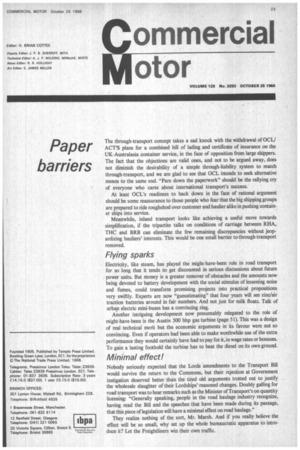Paper barriers
Page 25

If you've noticed an error in this article please click here to report it so we can fix it.
The through-transport concept takes a sad knock with the withdrawal of OCL/ ACT'S plans for a combined bill of lading and certificate of insurance on the UK-Australasia container service, in the face of opposition from large shippers. The fact that the objections are valid ones, and not to be argued away, does not diminish the desirability of a Simple through-liability system to match through-transport, and we are glad to see that OCL intends to seek alternative means to the same end. "Pare down the paperwork" should be the rallying cry of everyone who cares about international transport's success.
At least OCL's readiness to back down in the face of rational argument should be some reassurance to those people who fear that the big shipping groups are prepared to ride roughshod over customer and haulier alike in pushing container ships into service.
Meanwhile, inland transport looks like achieving a useful move towards simplification, if the tripartite talks on conditions of carriage between RHA, THC and BRB can eliminate the few remaining discrepancies without jeopardizing hauliers' interests. This would be one small barrier to through-transport removed.
Flying sparks
Electricity, like steam, has played the might-have-been role in road transport for so long that it tends to get discounted in serious discussions about future power units. But money is a greater remover of obstacles and the amounts now being devoted to battery development with the social stimulus of lessening noise and fumes, could transform promising projects into practical propositions very swiftly. Experts are now "guesstimating" that four years will see zinc/air traction batteries around in fair numbers. And not just for milk floats. Talk of urban electric mini-buses has a convincing ring.
Another intriguing development now presumably relegated to the role of might-have-been is the Austin 500 bhp gas turbine (page 51). This was a design of real technical merit but the economic arguments in its favour were not so convincing. Even if operators had been able to make worthwhile use of the extra performance they would certainly have had to pay for it, in wage rates or bonuses. To gain a lasting foothold the turbine has to beat the diesel on its own ground.
Minimal effect!
Nobody seriously expected that the Lords amendments to the Transport Bill would survive the return to the Commons, but their rejection at Government instigation deserved better than the tired old arguments trotted out to justify the wholesale slaughter of their Lordships' reasoned changes. Doubly galling for road transport was to hear remarks such as the Minister of Transport's on quantity licensing: "Generally speaking, people in the road haulage industry recognize, having read the Bill and the speeches that have been made during its passage, that this piece of legislation will have a minimal effect on road haulage."
They realize nothing of the sort, Mr. Marsh. And if you really believe the effect will be so small, why set up the whole bureaucratic apparatus to introduce it? Let the Freightliners win their own traffic.
















































































































